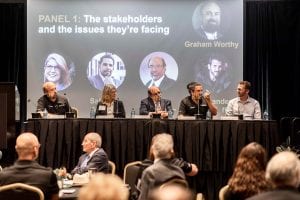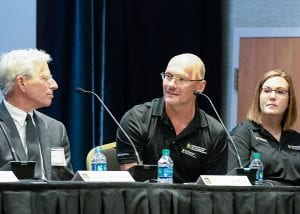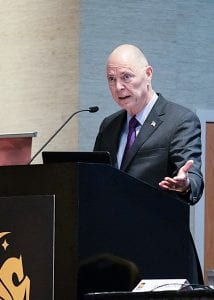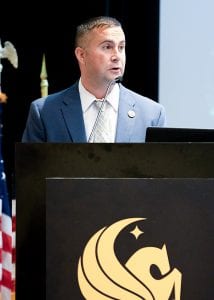UCF Coastal Working to Find Solutions for our Coastal Communities

Photo by Katie Arcic
By Rachel Stamford
Recently, Florida Governor Rick Scott declared a state of emergency due to red tide, a toxic algae bloom, that is devastating the southwestern coast of Florida. The UCF National Center for Integrated Coastal Research, also known as UCF Coastal, will serve as a mechanism to find solutions to this problem and many others that threaten the stability of our coastlines.
At its launch on Friday, UCF Coastal hosted its first panel of elected officials, industry leaders and scientists on the main campus to start a conversation about fixing immediate and long-term issues in coastal areas.
UCF Coastal, was formally approved earlier this year, by the Board of Governors, as a team of interdisciplinary experts who use both research and real community experiences to increase the sustainability of coastal communities.
Graham Worthy, chair of the biology department and director of UCF Coastal, said the idea of combining faculty in every college across the university stemmed from UCF President Dale Whittaker’s Faculty Cluster Initiative. In 2015, the initiative launched with the idea that problems facing society today are so large that no single discipline can address them adequately. Worthy said once the initiative began, he realized there were already over two dozen faculty on campus in various departments that worked on research for coastlines, and many had never even met each other.
Worthy said that among Florida’s population of 20 million people, nearly 16 million live in counties just a few feet above sea level; including the UCF area.
“Everyone who lives in Florida should be concerned about coastal issues. Even us in Orlando contribute. We are impacted by things that impact the coastline itself,” Worthy said. About his organization, Worthy added: “UCF has a tremendous amount of academic power to bring to the table; new faculty and long-term interest. It’s a great time to bring people together.”

The UCF Coastal launch event took place in the Fairwinds ALUMNI Center and consisted of eight panelists, in two separate panel presentations, ranging from expert researchers at UCF to coastal residents interested in preserving local environment.
Nearly every panelist had a different academic background and raised a multitude of both problems and solutions for Florida’s coastal issues.
Whitney Gray, administrator of the Florida Resilient Coastlines Program, discussed how the effect of climate change and sea level rise threatens the 76% of Florida’s population among 35 coastal counties, and $584 billion dollars in economic activity. Dr. Alan Fyall, a tourism marketing and graduate programs’ professor, said Florida’s tourism industry is being threatened as high-value beaches are lost by the changing coastal aesthetics from flooding and saltwater intrusion.
Not everyone on the panel had a background in environment or academia. Panelist Chris Lombardo, a city attorney and self-described “non-academic token human,” spoke of the issues facing Everglade City after hurricanes Donna and Irma nearly destroyed it. Lombardo said that 95% of property is now below sea level; forcing families to consider relocating and threatening an economy that generates $550 million dollars of tourism revenue for Southwest Florida.
“I live in a community that isn’t facing a problem,” Lombardo said. “We’re squarely in the middle of it.”
According to UCF Coastal, that is why discussions like this are needed.
Dr. Claire Knox is a current associate professor at UCF and panelist at the event. Knox said a cluster group is essential for taking on the coasts because they are a complex, dynamic issue requiring teamwork. “We can’t simply rearrange the deck chairs on the Titanic. We actually need to fix the problem,” Knox said. “Part about what we talked about today is that we can’t just talk about it.”
As coastal Louisiana native, Knox says UCF Coastal means home.
“The time we spent here at the event… we lost four football fields of wetlands in coastal Louisiana. We don’t have the luxury of just not taking action.” Knox worries her daughter may never visit where her grandparents are from due coastal issues. “It’s very personal. The Cajuns are losing our culture.”
The solutions put forth by UCF Coastal came in the form of answering questions from the audience. Coastal residents and researchers not part of the organization were encouraged to participate because of the importance of their experienced input.
Audience participation was also important because according to Alexander Rudloff, lead organizer of TEDx Orlando, the event is taking place at a time in history when people are cynical about expertise, so those experts are withdrawing from the conversation. Misinformation on social media and wiki pages lead to non-community members assuming they know more than leaders in the field. To that Rudloff disagrees, saying: “Information isn’t knowledge and it certainly isn’t wisdom.”
 U.S. Reps. Darren Soto and Bill Posey both attended the event and spoke on the issues; both of whom were in staunch support of UCF Coastal’s effort to find solutions through bringing together the community.
U.S. Reps. Darren Soto and Bill Posey both attended the event and spoke on the issues; both of whom were in staunch support of UCF Coastal’s effort to find solutions through bringing together the community.

“We can and we will do better,” Congressman Soto said about community and lawmakers’ effort to protect coasts. “And I believe with academia you’ll have a big role to play.”
Sen. Bill Nelson could not attend the event, but a representative said he considered the coasts “our heritage and our future.”
Worthy considered the first UCF Coastal event a success and noted that the coming-together of panelists and audience members alike after the speeches looked promising. “The primary goal was to get people together. A whole lot of conversations that were taking place during the break and afterwards will turn in to long-term conversations.”
The launch of UCF Coastal is just the beginning. Worthy looks forward to future events and projects that will make a difference in our coastal communities.
To view photos from the event click here.
